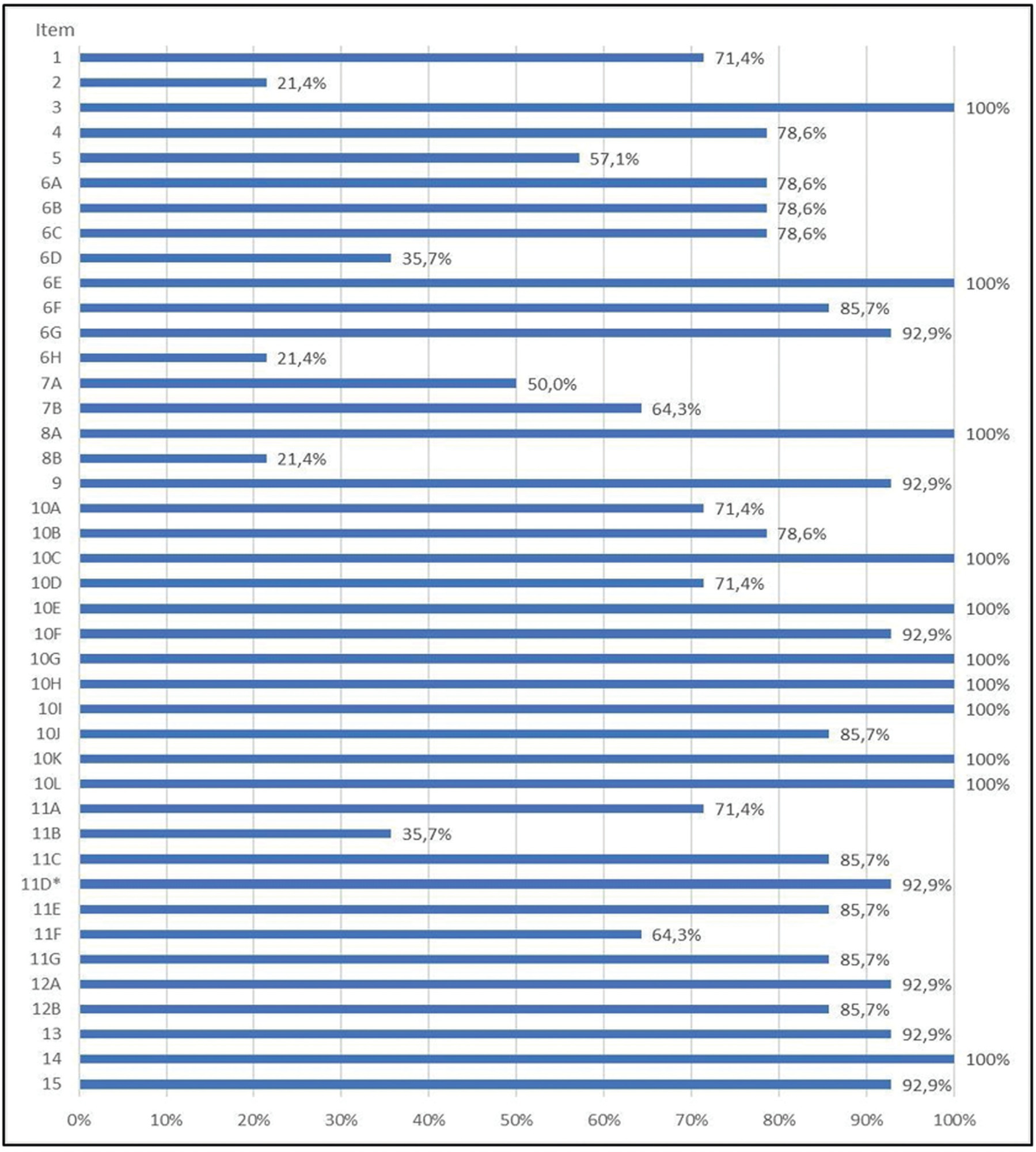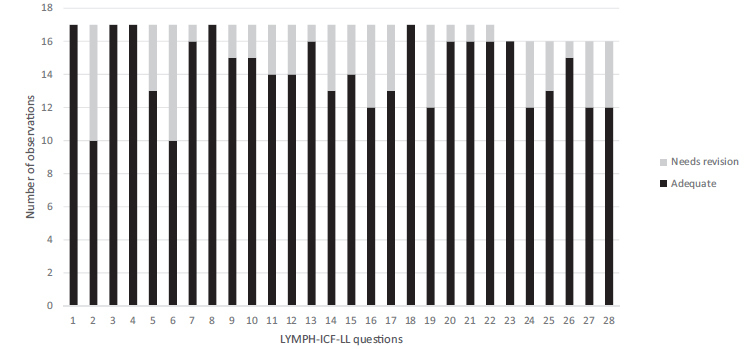-
Original Article12-11-2023
Adaptation and Validation of the International Pelvic Pain Society’s Quality of Life Questionnaire in Portuguese
Revista Brasileira de Ginecologia e Obstetrícia. 2023;45(10):575-583
Abstract
Original ArticleAdaptation and Validation of the International Pelvic Pain Society’s Quality of Life Questionnaire in Portuguese
Revista Brasileira de Ginecologia e Obstetrícia. 2023;45(10):575-583
Views220Abstract
Objective
In the present study, our aim was to translate, adapt, and validate the Pelvic Health History Form (a quality of life [QoL] questionnaire) of the International Pelvic Pain Society (IPPS) from English to Portuguese.
Methods
The study was approved by the Ethics and Research Committee (CEP, in the Portuguese acronym) and the IPPS. The "Transcultural Adaptation" method comprised 5 stages: translation, synthesis, backtranslation, expert review, and pretest. Cultural adaptation and validation included cognitive interviews and statistical analysis of unanswered items (> 15%) in 14 clinic patients from CPP and endometriosis clinic at Santa Casa de São Paulo.
Results
Strong equivalences were established between the USA and Brazil questionnaires in terms of semantics, idioms, experiences, and concepts. Eighteen culturally inappropriate items were identified and adjusted using the revised response rate index. The subjective form underwent rigorous assessments, confirming its accurate measurement of intended targets.
Conclusion
The methodology showed efficiency and equivalence, confirming its validity. The user-friendly format and inclusion of translated, adapted, and validated instruments in Portuguese make the form valuable for evaluating pelvic health, with potential for future research.
Key-words Chronic painPelvic painQuality of lifesurveys and questionnairestranslationvalidation studySee more
-
Original Article06-01-2018
Translation and Cultural Adaptation of the Short-Form Food Frequency Questionnaire for Pregnancy into Brazilian Portuguese
Revista Brasileira de Ginecologia e Obstetrícia. 2018;40(6):313-321
Abstract
Original ArticleTranslation and Cultural Adaptation of the Short-Form Food Frequency Questionnaire for Pregnancy into Brazilian Portuguese
Revista Brasileira de Ginecologia e Obstetrícia. 2018;40(6):313-321
Views200See moreAbstract
Objective
To translate and culturally adapt the short-formFood Frequency Questionnaire (SFFFQ) for pregnant women, which contains 24 questions, into Brazilian Portuguese.
Methods
Description of the process of translation and cultural adaptation of the SFFFQ into Brazilian Portuguese. The present study followed the recommendation of the International Society for Pharmacoeconomics and Outcomes Research for translation and cultural adaptation with the following steps: 1) preparation; 2) first translation; 3) reconciliation; 4) back translation; 5) revision of back translation; 6) harmonization; 7) cognitive debriefing; 8) revision of debriefing results; 9) syntax and orthographic revision; and 10) final report. Five obstetricians, five dietitians and five pregnant women were interviewed to contribute with the language content of the SFFFQ.
Results
Few changes were made to the SFFFQ compared with the original version. These changes were discussed with the research team, and differences in language were adapted to suit all regions of Brazil.
Conclusion
The SFFFQ translated to Brazilian Portuguese can now be validated for use in the Brazilian population.
-
Original Article10-01-2016
Uterine Fibroid Symptom – Quality of Life questionnaire translation and validation into Brazilian Portuguese
Revista Brasileira de Ginecologia e Obstetrícia. 2016;38(10):518-523
Abstract
Original ArticleUterine Fibroid Symptom – Quality of Life questionnaire translation and validation into Brazilian Portuguese
Revista Brasileira de Ginecologia e Obstetrícia. 2016;38(10):518-523
Views196See moreAbstract
Purpose
To translate into Portuguese, culturally adapt and validate the Uterine Fibroid Symptom - Quality of Life (UFS-QoL) questionnaire for Brazilian women with uterine leiomyoma.
Methods
Initially, the UFS-QoL questionnaire was translated into Brazilian Portuguese in accordance with international standards, with subsequent cultural, structural, conceptual and semantic adaptations, so that patients were able to properly answer the questionnaire. Fifty patients with uterine leiomyoma and 19 patients without the disease, confirmed by abdominal pelvic examination and/or transvaginal ultrasound, were selected at the outpatient clinics of the Department of Gynecology of the Universidade Federal de São Paulo (Unifesp). The UFS-QoL questionnaire was administered to all women twice on the same day, with two different interviewers, with an interval of 15 minutes between interviews. After 15 days, the questionnaire was readministered by the first interviewer. Reliability (internal consistency and test-retest), construct and discriminative validity were tested to ratify the questionnaire.
Results
The reliability of the instrument was assessed by Cronbach’s α coefficient with an overall result of 0.97, indicating high reliability. The survey results showed a high correlation (p= 0.94; p 0.001).
Conclusion
The UFS-QoL questionnaire was successfully adapted to the Brazilian Portuguese language and Brazilian culture, showing reliability and validity.
PlumX Metrics
- Citations
- Citation Indexes: 7
- Usage
- Full Text Views: 2784
- Abstract Views: 343
- Captures
- Readers: 24
-
Original Article02-01-2016
Translation and Cross-Cultural Adaptation of the Lymphoedema Functioning, Disability and Health Questionnaire for Lower Limb Lymphoedema into Portuguese Language
Revista Brasileira de Ginecologia e Obstetrícia. 2016;38(2):88-96
Abstract
Original ArticleTranslation and Cross-Cultural Adaptation of the Lymphoedema Functioning, Disability and Health Questionnaire for Lower Limb Lymphoedema into Portuguese Language
Revista Brasileira de Ginecologia e Obstetrícia. 2016;38(2):88-96
Views150See moreObjective
The objective of the study is to describe the process of translation and cross-cultural adaptation of the Lymphoedema Functioning, Disability, and Health Questionnaire for Lower Limb Lymphoedema (Lymph-ICF-LL) into (Brazilian) Portuguese.
Methods
The process was comprised of five steps - translation, back translation, revision by an expert panel, pretest, and final translation. The first translation was performed by two professionals of the healthcare area, and the back translation was performed by two translators. An expert panel assessed the questions for semantics and idiomatic, cultural, and conceptual equivalence. The pretest was conducted on 10 patients with lymphedema.
Results
Small differences were identified between the translated and back-translated versions, which were revised by the expert panel. The patients included in the pretest found 10 questions difficult to understand; these questions were reassessed by the same expert panel.
Conclusion
The results of the translation and cross-cultural adaptation of the Lymph- ICF-LL resulted in a Brazilian Portuguese version, which still requires validation with various samples of the local population.
PlumX Metrics
- Citations
- Citation Indexes: 13
- Usage
- Full Text Views: 3184
- Abstract Views: 309
- Captures
- Readers: 37




